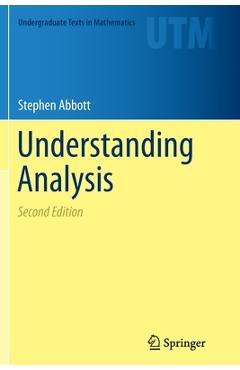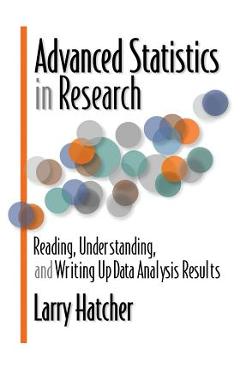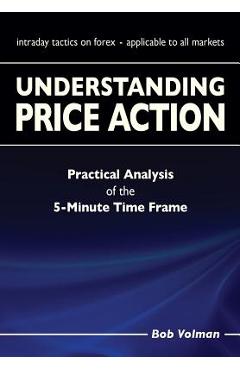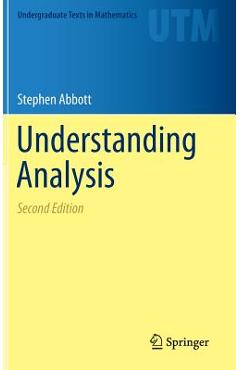Understanding Analysis - Stephen Abbott

Detalii Understanding Analysis - Stephen Abbott
libris.ro
334.73 Lei
418.41 Lei
Mathematics
Stephen Abbott
Understanding Analysis - Stephen Abbott - Disponibil la libris.ro
Pe YEO găsești Understanding Analysis - Stephen Abbott de la Stephen Abbott, în categoria Mathematics.
Indiferent de nevoile tale, Understanding Analysis - Stephen Abbott din categoria Mathematics îți poate aduce un echilibru perfect între calitate și preț, cu avantaje practice și moderne.
Preț: 334.73 Lei
Caracteristicile produsului Understanding Analysis - Stephen Abbott
- Brand: Stephen Abbott
- Categoria: Mathematics
- Magazin: libris.ro
- Ultima actualizare: 25-10-2024 01:12:27
Comandă Understanding Analysis - Stephen Abbott Online, Simplu și Rapid
Prin intermediul platformei YEO, poți comanda Understanding Analysis - Stephen Abbott de la libris.ro rapid și în siguranță. Bucură-te de o experiență de cumpărături online optimizată și descoperă cele mai bune oferte actualizate constant.
Descriere magazin:
This book outlines an elementary, one-semester course that exposes students to both the process of rigor, and the rewards inherent in taking an axiomatic approach to the study of functions of a real variable. The aim of a course in real analysis should be to challenge and improve mathematical intuition rather than to verify it. The philosophy of this book is to focus attention on questions which give analysis its inherent fascination. This new edition is extensively revised and updated with a refocused layout. In addition to the inclusion of extra exercises, the quality and focus of the exercises in this book has improved, which will help motivate the reader. New features include a discussion of infinite products, and expanded sections on metric spaces, the Baire category theorem, multi-variable functions, and the Gamma function. Reviews from the first edition: This is a dangerous book. Understanding Analysis is so well-written and the development of the theory so well-motivated that exposing students to it could well lead them to expect such excellence in all their textbooks. ... Understanding Analysis is perfectly titled; if your students read it that\'s what\'s going to happen. This terrific book will become the text of choice for the single-variable introductory analysis course; take a look at it next time you\'re preparing that class. -Steve Kennedy, The Mathematical Association of America, 2001 Each chapter begins with a discussion section and ends with an epilogue. The discussion serves to motivate the content of the chapter while the epilogue points tantalisingly to more advanced topics. ... I wish I had written this book! The development of the subject follows the tried-and-true path, but the presentation is engaging and challenging. Abbott focuses attention immediately on the topics which make analysis fascinating ... and makes them accessible to an inexperienced audience. -Scott Sciffer, The Australian Mathematical Society Gazette, 29:3, 2002

Produse asemănătoare

Advanced Statistics in Research: Reading, Understanding, and Writing Up Data Analysis Results - Larry Hatcher
![]() libris.ro
libris.ro
Actualizat in 28/10/2025
446.03 Lei

Understanding Development and Disorder in Cantonese using Language Sample Analysis, Paperback/Anita Mei-Yin Wong
![]() elefant.ro
elefant.ro
Actualizat in 28/10/2025
274.99 Lei

Levels 3-4 English: Reading for Understanding, Analysis and Evaluation Skills, Paperback/Jane Cooper
![]() elefant.ro
elefant.ro
Actualizat in 28/10/2025
108.99 Lei

Reading for Understanding, Analysis and Evaluation Skills: Second and Third Levels English, Paperback/Jane Cooper
![]() elefant.ro
elefant.ro
Actualizat in 28/10/2025
108.99 Lei

Understanding Price Action: practical analysis of the 5-minute time frame - Bob Volman
![]() libris.ro
libris.ro
Actualizat in 28/10/2025
278.31 Lei
Produse marca Stephen Abbott

The Proof Stage: How Theater Reveals the Human Truth of Mathematics - Stephen Abbott
![]() libris.ro
libris.ro
Actualizat in 25/10/2024
184.96 Lei

